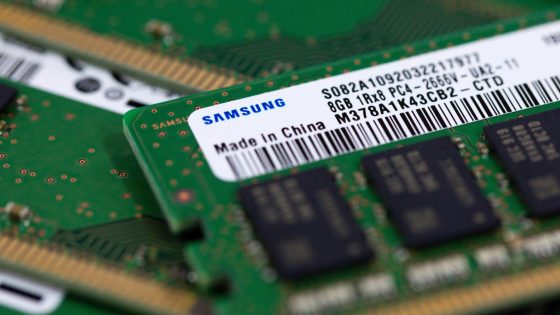Samsung Electronics’ fourth-generation high bandwidth memory or HBM3 chips have been cleared by Nvidia for use in its processors for the first time, three people briefed on the matter said.
SeongJoon Cho | Bloomberg | Getty Images
Tech and chip-related stocks in Asia fell on Thursday, after U.S. chip darling Nvidia reported its second-quarter results overnight, amid a broader decline in the region’s key markets.
Losses were most pronounced in companies with direct links to the U.S. tech giant, such as South Korean chipmakers SK Hynix and Samsung Electronics.
SK Hynix, which manufactures high bandwidth memory chips â used in AI applicationsâ for Nvidia, saw shares slump as much as 6.74%.
Samsung Electronics, the highest weighted stock on the South Korea’s benchmark stock index, Kospi, fell as much as 3.8%.
While the extent of Samsung’s supplier relationship with Nvidia is not fully known, the company is expected to be manufacturing HBM chips for some Nvidia products, according to Reuters.
Other direct suppliers to Nvidia such as Taiwan Semiconductor Manufacturing Company and Hon Hai Precision Industry â known internationally as Foxconn â saw losses of as much as 2.8% and 2.96%, respectively.
The spillover also extended to other tech stocks, although to a smaller extent. Japanese semiconductor related stocks such as Renesas, Advantest and Tokyo Electron fell as much as 3.2%, 3.6% and 3.49% respectively.
Separately, Chinese chipmakers listed in Hong Kong fell, despite being largely unrelated to the Nvidia value chain. SMIC, which is partially state owned, lost about 1.4%, while Hua Hong Semiconductor fell 1.66%.
Runaway train slowing down
While the Nvidia beat quarterly revenue and earnings per share estimates, the fall in shares could have been triggered by fears that the company may not be able to deliver explosive growth in the current quarter, according to Luke Rahbari, CEO of Equity Armor Investments told CNBC’s “Squawk Box Asia.”
Rahbari said the results are “really good”, but also noting that “For so many quarters, Nvidia had blown out expectations of analysts … People [are] maybe thinking the runaway train is slowing down a little bit.”
He still remains bullish on the company, highlighting “no company in the world, in my estimation, has the position that Nvidia has in their industry, such a dominant position.”
Nvidia’s gross margin, however, slipped to 75.1% from 78.4% in the prior period, while it annual gross margin forecast of “mid-70% range” was below analysts’ estimate of 76.4%, according to StreetAccount.
Speaking to CNBC’s “Squawk Box Asia,” Mark Lushcini, chief investment strategist at financial advisory firm Janney Montgomery Scott, called the decline in Nvidia shares a “rounding error,” citing how much Nvidia had risen this year. On a year to date basis, shares have risen about 150%.
He noted, “the company is growing fast, but the pace of growth is slowing down for 4 quarters now. For a company that’s trading on a 40-50 times forward earnings, that’s a high demand hurdle to overcome vs expectations.”

Source Agencies




